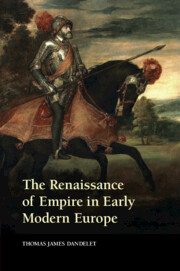Book contents
- Frontmatter
- Contents
- List of illustrations and maps
- Acknowledgments
- Introduction
- 1 The Rebirth of the Caesars
- 2 The Return of Caesar: The Hybrid Empire of Charles V, 1517 to 1556
- 3 The Spanish Empire, Apex of the Imperial Renaissance
- 4 The Renaissance of Empire in France
- 5 Britain as Late Renaissance Empire
- Conclusion
- Select Bibliography
- Index
- References
5 - Britain as Late Renaissance Empire
Published online by Cambridge University Press: 05 June 2014
- Frontmatter
- Contents
- List of illustrations and maps
- Acknowledgments
- Introduction
- 1 The Rebirth of the Caesars
- 2 The Return of Caesar: The Hybrid Empire of Charles V, 1517 to 1556
- 3 The Spanish Empire, Apex of the Imperial Renaissance
- 4 The Renaissance of Empire in France
- 5 Britain as Late Renaissance Empire
- Conclusion
- Select Bibliography
- Index
- References
Summary
Not Caesar’s deeds, nor all his honours won
In these West-parts; nor, when the war was done,
The name of Pompey for an Enemy;
Cato to boot; Rome, and her liberty;
All yielding to his fortune: nor, the while,
To have ingrav’d these Acts with his own stile;
And that so strong, and deep, as might be thought
He wrote with the same spirit that he fought;
Not that his Work liv’d, in the hands of foes,
Un argu’d then; and (yet) hath fame from those:
Not all these, Edmonds, or what else put to,
Can so speak Caesar, as thy Labours do.
For, where his person liv’d scarce one just age,
And that ‘midst envy and Parts; then, fell by rage;
His deeds too dying, save in Books: (whose good
How few have read! how fewer understood!)
Thy learned hand, and true Promethean Art,
As by a new creation, part by part,
In every Counsel, Stratagem, Design,
Action, or Engine, worth a Note of thine,
T’all future time not only doth restore
His life, but makes that he can die no more.
Ben Johnson, “To my friend master Clement Edmonds, Epigramme,” in Clement Edmonds, Observations Upon Caesar’s Commentaries (London, 1609)
Of the major European monarchies that eventually ruled new global empires in the early modern period, the British monarchy stands out for the slow, halting, and crooked path that eventually led to its own distinctive Imperial Renaissance in the late sixteenth, seventeenth, and eighteenth centuries. The “first empire,” commonly viewed as spanning the two centuries between the claiming of Newfoundland in 1583 and the loss of the American colonies to 1783, lagged behind the Spanish by more than a century in terms of real colonization in North America. Compared to their continental rivals, the British monarchs in the sixteenth and seventeenth centuries had fewer resources, greater political and religious internal divisions, and less military power, all of which stood in the way of imperial aspirations.
- Type
- Chapter
- Information
- The Renaissance of Empire in Early Modern Europe , pp. 248 - 281Publisher: Cambridge University PressPrint publication year: 2014



